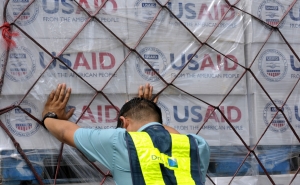Xylazine’s Growing Impact on Drug Use and Treatment Options
Insights from social media could shape effective public health strategies, clinical guidelines, and research priorities.

A recent study published in the Journal of Addiction Medicine offers a unique perspective on the rapidly growing issue of xylazine contamination in the U.S. drug supply. Led by a team of researchers, including Department of Health Policy and Management’s Olivia K. Sugarman, PhD, MPH and Brendan K. Saloner, PhD, the study examined firsthand accounts from people who report using drugs (PWRUD) via their postings on social media platform Reddit.
According to the study, xylazine—a veterinary tranquilizer also referred to as “tranq”—has increasingly been found in combination with fentanyl; has been implicated in rising overdose deaths and other serious health complications such as severe soft tissue wounds and withdrawal symptoms; and has been found in nearly every U.S. state, where it has contributed to a remarkable 275% rise in overdose deaths between 2019 and 2022. Given the current multi-regional presence of xylazine in the U.S., many persons who use drugs unknowingly continue to be exposed to this veterinary drug.
To better understand the experiences and attitudes of PWRUD regarding xylazine, the research team conducted a qualitative content analysis of Reddit posts and comments from ten drug-related subreddits. They analyzed content that mentioned “xylazine” or “tranq” until January 2023, coding 1,803 posts to identify recurring themes and insights.
Three major themes emerged from this analysis, including individual experiences with xylazine, behavioral changes in response to contamination, and lack of treatment options and self-treatment approaches.
The researchers found that people on the platform reported negative experiences with xylazine, describing the effects as overwhelmingly sedative without any euphoria related to opioids. Reports of severe and sudden wounds were common, as were the intense symptoms of withdrawal. Users reported that xylazine withdrawal was often more painful than opioid withdrawal and described overdoses related to xylazine as intense and highly disorienting, with reports of sudden blacking out or losing their memory.
According to the study, the presence of xylazine has caused many to adapt their drug use behaviors. Redditors described harm reduction strategies related to observing changes in the appearance of drugs, altering dosages, or attempting to abstain from drug use altogether. Concerns about the risk and danger associated with xylazine sparked interest in discussing detection methods and ways to use it more safely.
Researchers also noted the medical treatment gap in exposure to xylazine. According to the study, users were frustrated by a lack of clinician awareness and resources on xylazine in health facilities. To fill that gap, some posters shared their own treatment experiences with xylazine and methods that worked for them. For example, clonidine—which in the same drug class as xylazine—was reportedly used to relieve xylazine withdrawal symptoms.The posts stressed the pressing need for better-informed clinical strategies and accessible treatment options tailored to xylazine exposure.
“This is one of the first studies to harness social media data to understand the real-world experiences of people exposed to xylazine,” said Sugarman. “By analyzing Reddit content, we were able to learn valuable information about people’s experiences and gaps in xylazine-related care in traditional clinical settings. That information often goes unarticulated in traditional clinical settings due to shame or other access issues.”
The findings suggest several critical steps for public health and clinical practice, including:
- Improved Surveillance and Testing: There is a need to develop more tools for detecting xylazine, and public health officials need to strengthen surveillance to track trends in its spread and effects.
- Informed Harm Reduction Strategies: Education about the risks associated with xylazine should be accompanied by distributing harm reduction supplies, including wound care kits and naloxone, to address its impact.
- Withdrawal Treatment Plans: Physicians should be prepared to treat xylazine withdrawal, including, when appropriate, with properly prescribed medications such as clonidine.
- Reducing Stigma in Health Care: Stigma associated with drug use needs to be decreased in healthcare to promote seeking assistance and services.




